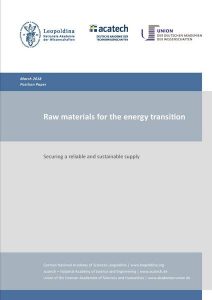The supply of metals and energy products depends on various factors, i.e. how raw material prices develop, how transparent and accessible the markets are, and whether high environmental and social standards can be achieved in mining. In a position paper, the national academy of science and engineering, acatech, describes how Germany can become more independent of raw material imports and what measures can help to secure the supply in the long term.
Along with other high-tech products, renewable energy plants, storage facilities and grids require ever larger quantities of a growing variety of metals, such as rare earths, gallium, germanium, indium, tellurium and the platinum group elements. The natural metal deposits around the world, while basically sufficient, are unequally distributed and inconsistently used. 86 % of the rare earths, for instance, are produced in China – they are used in wind turbines, batteries and electric motors. If individual countries abuse this market power, e.g. by obstructing the exportation, countries like Germany will no longer be able to obtain sufficient metals.

Raw materials for the energy transition. Securing a reliable and sustainable supply (Series on Science-Based Policy Advice), 2018. ISBN: 978-3-8047-3665-8
The results include the following measures that could contribute to securing the metal supply in the long term:
- By exploiting new deposits in Germany and Europe as well as in the deep sea, the raw material base could be expanded
- Bilateral commodity agreements and partnerships are easier to implement than agreements between several states. In addition to consolidating raw material supply relations, they can aim at establishing environmental and social standards, improve job security in the raw materials production and contribute to climate protection and raw material efficiency.
- A further approach is metal recycling: End-of-life vehicles, electronic devices and power lines are valuable raw material sources. As the recovery rates for many high-tech elements are low, the entire process chain should be improved.

















